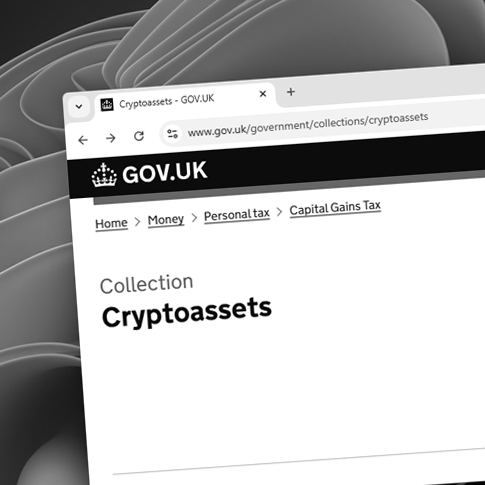Crypto Assets and HMRC Tax Investigations

The UK does not have a specific tax regime for crypto assets such as cryptocurrency or tokens. Instead, it applies the standard tax laws.
HMRC does not treat cryptocurrency as currency, it is considered a form of property or asset. When part of any form of transaction, cryptocurrency may incur liabilities, primarily related to Income Tax or Capital Gains Tax. Additionally, National Insurance Contributions (NIC) will also be payable by both employer and employee where remuneration occurs through the transfer of cryptoassets.
Transactions which may lead to a potential tax liability not only include the obvious ones of buying, selling or exchanging but also, Mining, Staking and receiving Airdrops and Forks.
Failure to report and declare profits on any transaction may be considered tax evasion, potentially leading to severe consequences involving financial penalties, fines and, being a criminal offence, may even lead to criminal charges being brought by HMRC.
Nazaqat Maqsoom of KANGS outlines the manner in which crypto transactions may attract a tax liability.
Potential Tax Liability
HMRC states that ‘anyone with crypto assets should declare any income or gains above the tax-free allowance on a tax return.’
Investors are generally being drawn into a marketplace which very few people comprehensively understand, lured by the perceived great wealth which is certainly not guaranteed or secured or reliable. Multiple trading platforms tend to be used resulting in investors struggling to consolidate their trading history. Additionally, the constant fluctuation of crypto prices renders it extremely difficult to identify the extent of any gains or losses.
Whilst dealing in crypto assets of any description is becoming increasingly popular, the world of cryptocurrency is still very much in its infancy. HMRC are actively developing strategies for controlling and dealing with the many practical issues that arise as quickly and effectively as possible.
Capital Gains Tax
Liability may arise upon, for example:
- the sale of crypto assets for fiat (government backed currency),
- exchanging one type of crypto asset for another,
- using crypto assets to buy goods or services,
- gifting crypto assets to another person, save for a spouse or civil partner,
- disposal of staking rewards,
- airdrops received without providing a service,
- disposal of forks.
Certain allowances are available to reduce the liability:
- transaction fees,
- advertising fees seeking a buyer or seller,
- costs of preparation of a contract governing the transaction,
- making a valuation for the purpose of calculating the gain.
Capital gains tax is charged at the prescribed rates applicable at the time of disposal.
Income Tax
Mining Rewards, Staking Rewards, Airdrops and Forks
Crypto Mining is the activity which creates new units of cryptocurrency and if successful, HMRC treats it as taxable income. Income tax is calculated on fair market value of the coins at the time of mining.
Crypto Staking is cryptocurrency’s equivalent of fixed-income assets. Instead of earning interest, digital tokens are locked to a blockchain in order to earn rewards. Staking rewards are regarded by HMRC as income which is taxed at the individual’s tax rate. Rewards may also attract Capital Gains Tax upon disposal.
An Airdrop is a free cryptocurrency distribution, frequently as part of a promotional campaign or blockchain upgrade. Airdrops received without providing a service are taxed as a capital gain upon disposal whilst airdrops linked to services, such as completing a task, are treated as income.
Forks occur when a blockchain splits into two, creating a new cryptocurrency. As an example, Bitcoin Cash was created after a Bitcoin fork. Forks are subject to Capital Gains Tax upon disposal.
Record Keeping
HMRC requires investors to maintain details of all crypto transactions and keep meticulous records, enabling the accurate calculation of gains and the reporting of them by way of self-assessment tax returns.
Tax-Free Activities
Detailed record keeping is also essential because not all crypto actions attract a tax liability, such as an individual’s transfer of crypto between personal wallets or holding assets without trading them.
Failure to Account to HMRC
HMRC regularly conducts compliance checks and investigates self-assessment returns and declarations of information received. It frequently sends ‘nudge letters’ to those suspected of failing to pay the correct tax on their crypto gains.
Additionally, HMRC collaborates with major crypto exchanges to access all transactions records.
Failure to declare crypto assets and gains may result in:
- payment of unpaid tax,
- interest being charged on unpaid tax,
- penalties for failure to pay tax,
- criminal investigation,
- criminal prosecution.
How Can We Assist?
Many investors will find it challenging to provide HMRC the detailed information required when questioned about the income derived from cryptocurrency dealings.
Our solicitors monitor the constant rapid developments occurring in cryptocurrency and advises clients upon a range of complicated issues. They also provide guidance upon the relevant and very essential trading records which must be maintained.
If you have received a nudge letter from HMRC, it usually means that any information provided is regarded as ‘prompted’ and amounts to ‘non-voluntary disclosure.’ Any penalties imposed could be higher than if disclosure were voluntary.
If you are being investigated or have received a letter from HMRC, it is important to seek expert legal advice. The team at KANGS has extensive experience defending individuals and businesses in HMRC tax investigations.
Our solicitors can provide guidance on your disclosure obligations to HMRC, assist in disclosure preparation and liaise with HMRC on your behalf. If we can be of assistance, we would be delighted to hear from you, simply contact us using the details below:
Tel: 0333 370 4333
Email: info@kangssolicitors.co.uk
We provide initial no obligation discussion at our three offices in London, Birmingham, and Manchester. Alternatively, discussions can be held through live conferencing or telephone.
Top ranked by leading legal directories Chambers UK and the Legal 500.







